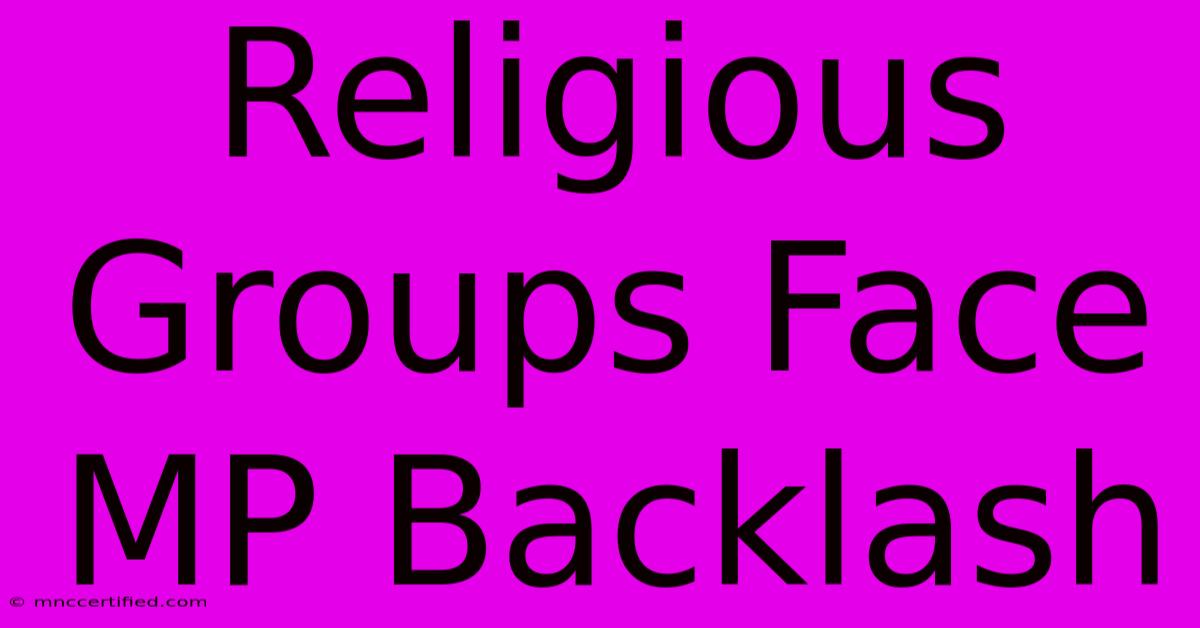Religious Groups Face MP Backlash

Table of Contents
Religious Groups Face MP Backlash: Navigating Political Scrutiny
Religious groups across the nation are facing increasing scrutiny and backlash from members of Parliament (MPs), sparking heated debates about religious freedom, political influence, and the separation of church and state. This complex issue demands a nuanced understanding, encompassing various perspectives and potential consequences.
Understanding the Roots of the Backlash
The recent surge in MP-led criticism against religious organizations stems from a confluence of factors:
1. Allegations of Financial Misconduct:
Several religious groups have faced accusations of misusing funds, leading to investigations and public outrage. MPs are under pressure to hold these organizations accountable and ensure transparency in their financial dealings. This scrutiny often involves demanding access to financial records and public audits, sparking clashes between religious organizations and parliamentary oversight committees. Keywords: religious organizations, financial misconduct, transparency, accountability, parliamentary investigations.
2. Concerns about Political Influence:
Some MPs express concerns about the undue influence of religious groups on political decision-making. This worry is amplified when religious organizations actively endorse or oppose political candidates or engage in lobbying activities. The debate centers on the appropriate boundaries between religious advocacy and political intervention. Keywords: political influence, religious lobbying, political endorsements, separation of church and state.
3. Controversial Social Stances:
Certain religious groups' stances on social issues such as same-sex marriage, abortion, and gender equality have drawn intense criticism from MPs and the broader public. These disagreements highlight the tension between religious freedom and the rights of marginalized groups. The ensuing public discourse often involves accusations of discrimination and intolerance. Keywords: social issues, religious freedom, discrimination, LGBTQ+ rights, abortion rights, gender equality.
4. Lack of Public Trust:
Erosion of public trust in religious institutions, fueled by scandals and controversies, has made MPs more inclined to scrutinize their activities. This loss of confidence necessitates greater transparency and accountability from religious organizations to regain public trust and maintain their legitimacy. Keywords: public trust, religious scandals, institutional accountability, transparency in religious organizations.
The MPs' Response and Its Implications
MPs are employing various tactics to address their concerns, including:
- Increased legislative oversight: New laws or amendments are being proposed to regulate the financial operations and political activities of religious groups.
- Public hearings and investigations: Parliamentary committees are holding hearings to examine allegations of misconduct and gather evidence.
- Increased media scrutiny: MPs are using media platforms to raise awareness about their concerns and pressure religious organizations to reform.
These actions have significant implications:
- Restricting religious freedom: Overly stringent regulations could inadvertently curtail legitimate religious practices and freedom of expression.
- Increased polarization: The backlash may further deepen societal divisions along religious and political lines.
- Erosion of public trust in government: If the MP's actions are perceived as biased or heavy-handed, it could damage public trust in the political process.
Finding a Path Forward
Navigating this complex issue requires a balanced approach that respects both religious freedom and the need for accountability and transparency. Open dialogue, constructive engagement, and a commitment to mutual understanding are crucial to finding common ground. Keywords: religious freedom, accountability, transparency, dialogue, mutual understanding, political solutions.
This requires:
- Enhanced transparency and accountability measures: Religious organizations should proactively embrace greater transparency in their financial practices and governance structures.
- Respectful dialogue and engagement: Open and respectful dialogue between MPs, religious leaders, and civil society organizations is essential to bridge divides and find mutually acceptable solutions.
- Protecting religious freedom while addressing legitimate concerns: Balancing the need for accountability with the protection of fundamental religious freedoms requires careful consideration and well-crafted legislation.
The ongoing backlash against religious groups highlights a critical need for open dialogue and a commitment to finding a balance between upholding religious freedoms and addressing legitimate societal concerns. The future of this relationship will depend on the ability of all stakeholders to engage constructively and responsibly.

Thank you for visiting our website wich cover about Religious Groups Face MP Backlash. We hope the information provided has been useful to you. Feel free to contact us if you have any questions or need further assistance. See you next time and dont miss to bookmark.
Featured Posts
-
Insurance Doctor Of Richmond
Dec 01, 2024
-
Barcas Slump Flick Seeks Turnaround
Dec 01, 2024
-
Penn State Maryland Big Ten Implications
Dec 01, 2024
-
England Vs Usa Game Where To Watch
Dec 01, 2024
-
Draw For Palace Munozs Goal
Dec 01, 2024